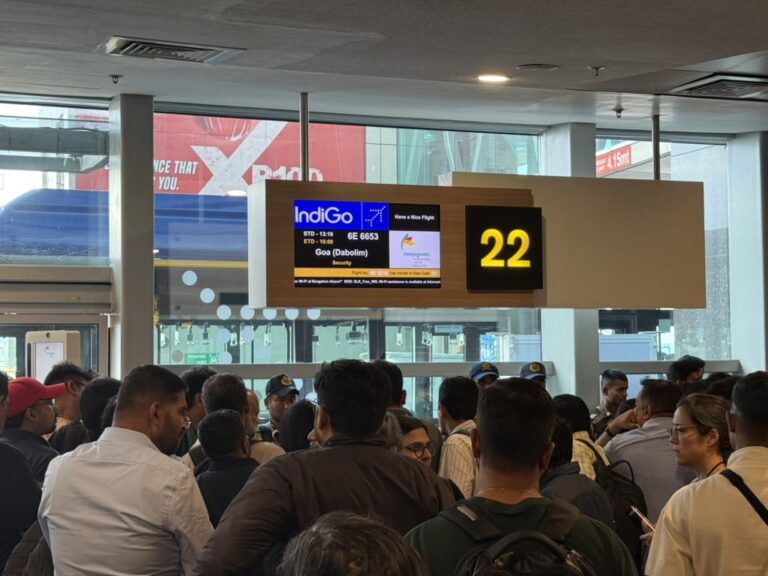
La has become a role model for his fellow farmers. With their hard work and the support from FAO and KOICA, farmers are better managing the limitations of the seasons and forging more secure and prosperous livelihoods. ©FAO/ Bounmee Maokhamphiou
For years, La Xayyavieng’s annual income was less than USD 1350 (LAK 30 million) – barely enough to meet his family’s basic needs. But deep in his heart, he had “always known that agriculture is the lifeline for us to survive and to grow.” The 46-year-old father of three long harboured the wish for his children to be agents of change, bringing knowledge and experience back from neighbouring Vietnam to the family’s land. But as things turned out, La himself is now already creating the change in Attapeu province in the southeast of the Lao People’s Democratic Republic. He’s increased the family’s income by 160 per cent in just one season, thanks to a bumper watermelon crop – and without needing to set foot outside his country.
The spectacular transformation has come after he was selected as one of the residents from his home village of Phok, in Saysettha District, to take part in a project called “Building Climate-Resilient and Eco-friendly Agriculture Systems and Livelihoods” (Climate REAL). The Food and Agriculture Organization of the United Nations (FAO) implements the initiative with financial support from the Korea International Cooperation Agency (KOICA).
Lack of access to technologies and knowledge limited La to traditional practices, relying for income on rain-fed rice farming. Getting by in the rainy season was always problematic. Growing vegetables was not an option as they would rot or wash away and the effort would be wasted.
But the FAO project opened up new perspectives, demonstrating that successful vegetable farming could happen in both the rainy and dry seasons.
Now, by reining in the rainy season, and helping crops flourish in the wet season, Laotian farmers are becoming self-sufficient!
It was during learning and knowledge exchange visits to other project areas in Savannakhet and Champasak Provinces further to the north, that La realised what the future could hold. “I knew from the bottom of my heart that greenhouses would work for me as soon as I saw them and understood what they were,” he explained.
The greenhouse helps to minimise waterlogging and damage from heavy rain. While the plastic sheeting was provided by the project, farmers contributed their labour and items such as the wooden structures and nails. But for the greenhouses to be successfully used, La would further develop his skills through Farmer Field School training and would receive agricultural inputs to get started.
A key part of his skills development was agribusiness training, which provided La with guidance on understanding market needs and business operations such as record-keeping and analysis.
From the first rainy season crop of lettuce, choy sum, coriander, morning glory and shallot all grown in the greenhouse, La reported that he was able to earn nearly as much in just four months as he would previously earn in a whole year.
The Climate REAL project also supplied watermelon, cucumber and corn seeds for La to experiment with during the dry season. These proved to be a huge success, with La seeing a return on investment of up to 900 per cent for watermelon. This was not just luck but due to a combination of the whole range of skills he acquired, from land preparation right through to harvesting.
The solar-powered, small-scale irrigation system provided under the project and shared by several nearby farmers has been a key factor in increased profits as La does not have to cover the cost of electricity to irrigate.
“In only 75 days of work, I earned an income of LAK 38.5 million (USD 1 738) from selling watermelon and LAK 2.65 million (USD 117) from selling cucumber. Where else I could earn such money from what I am passionate about?”
He added, “The project has given me a lot, much more than I could imagine. It is the hope and prosperity that I have always dreamed of.”
La has been designated as one of the Climate REAL project’s model farmers after building his skills and knowledge from this project and earlier initiatives in the area.
Farmers in Phok Village – especially members of La’s production group – are already seeking his advice for the coming planting seasons. The plan is to grow tomatoes, spring onions, lettuce and coriander, as the demand and prices are high.
To pave the way for his children, La has also already started to transfer his experience and know-how to his youngest son, Noi, who is now 17 years old and studying at a secondary school in the district. La is also about to embark on expanding his greenhouses from two to ten units in the near future. For La and his fellow farmers, with their hard work and the support from FAO and KOICA, a whole new path has opened up, better managing the limitations of the seasons and bringing more secure and prosperous livelihoods.
Source: The FAO News and Media Office, Rome
– global bihari bureau





